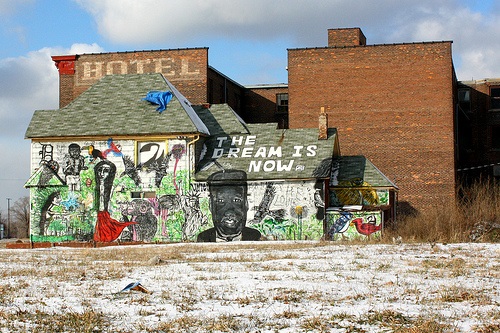
May 15, 2015; MLive
Detroit has so many vacant properties that the phrase “abandoned Detroit” has crept into the vernacular. Photographers from near and far have documented the city’s empty buildings. According to architect/photographer Zach Fein, “The middle and upper classes vanished, leaving behind a massive lower class with no means to maintain a city that quickly became twice the built size it needed to be.”
For years, the city has been tearing down some buildings and auctioning others for incredibly low prices—which is how floral designer Lisa Waud, owner and founder of Pot & Box, acquired two adjacent houses on the border of Detroit and the city of Hamtramck, for $250 each. Her plans for the property speak volumes about the power of creativity, resilience, and repurposing.
Sign up for our free newsletters
Subscribe to NPQ's newsletters to have our top stories delivered directly to your inbox.
By signing up, you agree to our privacy policy and terms of use, and to receive messages from NPQ and our partners.
In October, the 15 rooms on the property will be transformed into a flowery site-specific art installation. Each of the rooms will be decorated from floor to ceiling with flowers and live plants, with one lead designer and a team of helpers for each room. The installation will be created using donated, American-grown flowers and plants. The project, called Flower House, aims to showcase “innovation in floral design and repurposing forgotten structures in the City of Detroit.” For three days, the house will be open to the public for most of the time, although “a few private, reserved opportunities will be available throughout the exhibition for wedding ceremonies, photography sessions, or other creative projects.” Which seems like a lovely way to breathe life back into a tired old building, if only ever so briefly.
At the end of the art installation, Flower House will be “responsibly deconstructed” with the assistance of the nonprofit Reclaim Detroit. Deconstruction—as opposed to demolition—is defined by Reclaim Detroit as “the process of systematically dismantling a structure with the intent to recover the maximum amount of materials for the highest and best re-use.” Waud estimates as much of 75% of her property’s reusable materials will be diverted from the landfill through this approach. (Multiplied by the thousands of vacant buildings Detroit has to deal with, the environmental impact of the deconstruction movement is considerable.)
But the Flower House story gets even better once the houses have been deconstructed. Waud plans to turn the land into a flower farm and design center for Pot & Box, creating an urban oasis just a few miles from downtown Detroit. And the flowers and plants from the art installation will be used to start the composting system for the farm, naturally.—Eileen Cunniffe












